The importance of pastors in this critical time
By The Honorable Minister Louis Farrakhan | Last updated: Dec 29, 2015 - 2:39:49 PMWhat's your opinion on this article?
[Editor’s note: The following article contains edited excerpts of the Honorable Minister Louis Farrakhan’s keynote address delivered during the American Clergy Leadership Conference’s Prayer Breakfast hosted by Pastor T.L. Barrett and Life Center C.O.G.I.C. in Chicago, Illinois on November 17, 2015. Go to http://justiceorelse.com/betheorelse and learn how you can participate in this year’s call to “redistribute the pain.” To order this message now available in its entirety on DVD, CD and MP3, please visit http://store.finalcall.com or call 1.866.602.1230, ext. 200.]
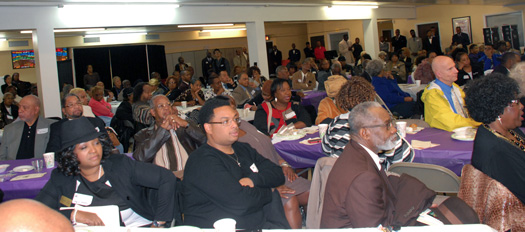
Pastors from Chicago and nearby cities enjoyed a prayer breakfast and keynote address by Min. Farrakhan. Photo: Richard B. Muhammad
|
To be a servant of God is great honor to us; our vessels have to be made ready, that He can use us for His Glory. None of us are perfect—and some of us may not be trying ... but the Master said, “Be ye perfect, even as your Father in heaven is perfect.” (Matthew 5:48) So when Jesus said that: Not only the world, but human beings have been put on a course that will ultimately lead to human perfection.
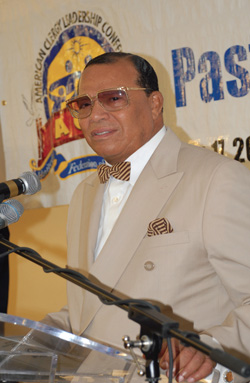
The Honorable Minister Louis Farrakhan
|
And you know, my dear brothers and sisters, and pastors: You really are the most important vessels of this time. But we must purify the vessel, because we can’t put new wine in an old wineskin, lest the wineskin break and the good wine waste. (Matthew 9:14-17)
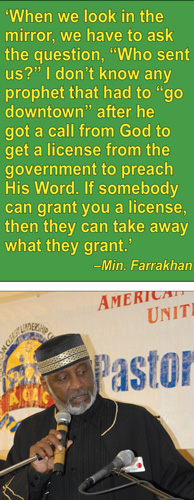
Reverend T.L. Barrett was instrumental in coordinating the meeting of pastors. Photos: Richard B. Muhammad
|
So this morning I feel so blessed to be with you, because the hope of a sick community rests on us. I heard the prayers this morning: “Father God,” you said, “touch the city; touch the state. Father God, stop the bloodshed.” How will He do it? The scripture teaches in the Book of Romans, Chapter 10, “How can they know except they have a preacher? And how can they have a preacher except he be sent?” When we look in the mirror, we have to ask the question, “Who sent us?” I don’t know any prophet that had to “go downtown” after he got a call from God to get a license from the government to preach His Word. If somebody can grant you a license, then they can take away what they grant. But if God licenses us: If He takes it, we are lost. ...
And you know, brothers and sisters, it takes a humble heart and spirit [to be a servant of God]; because sometimes we, as leaders of our faith-based communities can sometimes get carried away with ourselves. And because the people shout and the people pay their tithes, and we are able to have an upgrade in our cars and in our homes, and in our clothes, and we’re invited to big functions with the governor, or the mayor—or other unrighteous lying politicians—and we go like beggars, asking them [for a handout]. When they give you, they expect something from you.
***
I loved your singing of that song (“His Blood Still Works”); but the words: “His blood still works and I’m glad to report that it never lost its power. Yes, it works; I’ve been redeemed by the Blood of the Lamb. Oh, the blood of Jesus ...” What do you mean “the blood of Jesus”? Blood is out here on the sidewalks every day. Blood is in the world every day. But the blood of Jesus can stop that shedding of blood if you understand, we understand, what that “blood” is.
When you take “communion,” you may drink grape juice or a little wine ... but that’s not what “the blood of Christ” is. The blood of every living thing carries its disease and its health, so when you go for a full examination, they take your blood; and the blood has things in it that, if you know how to read the blood, you can tell the patient “what is the matter” (“Your creatinine is high, we’ve gotta check your kidneys,” “Your bilirubin is not showing up right; maybe we need to check your liver,” or, “Oh, I see an antigen in your blood that says your PSA has gone up a little high. We’ve gotta check for something.”)
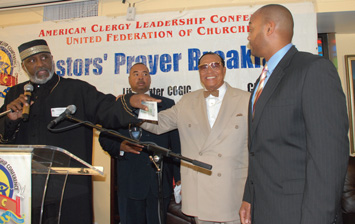
Reverend T.L. Barrett shares a story on how his son was raised to love Jesus over Santa Claus. Photos: Richard B. Muhammad
|
After supper, Jesus said: “Drink this in remembrance of me”—heavy scripture—“this is my blood which I shed for the new testament, and for the remission of sins.” Then you go to the Book of John (Chapter 14) where Jesus starts telling people “who” he is (because he wasn’t talking too much about himself in the beginning of his assignment). So, when Jesus asked the disciples, “Who do they say I am?” the disciples responded, “Some of them say you’re ‘John The Baptist,’ some of them say you’re ‘Elijah’, some of them say you’re some other prophet.” Jesus then asked them, “Who do you say I am?”—and then Peter spoke for the disciples: “Thou art The Christ, The Son of The Living God.”
***
Now, my Muslim family here might say, “Boy, Farrakhan coming on like a Christian!” Yes, I am a “Christian”—amen: I have become acquainted with Christ. You say, “Well, Farrakhan, I thought you were a Muslim.” That, I am. That’s what Jesus was: He said, “Not my will, but Thy Will be done.” That’s all Islam is, that we surrender our will to do The Will of God. How many of us, when we have to choose between what our flesh desires and what God Wills, that we choose what our flesh desires and at that moment we say, “God, I’ll be with you later”?
“The Blood of Christ” is The Life That He Lived. “Blood” is the essence of our life; when you lose your blood you lose your life. When there is disease in your blood, then you have to have some medication to rectify what is in your blood that’s showing up that is diseased.
Our lives are diseased. We talk “Christ,” we talk “Muhammad,” we talk “God,” but sometimes we make choices that say that we believe in one minute, and in the next minute we act contrary. Dear pastors, we that are leading our people: They can’t be any better than what we are. We are charged by Christ, by Muhammad, by God, to set the example. Jesus said, “You draw nigh unto me with your lips, but your hearts are far removed from me.” Every time we break with Christ by doing our will and not God’s Will—and Christ is the example of “perfect obedience”—then we lose the power in his life’s blood. There will never be a loss in that blood if we live The Life directed by The Word ... but who will revive pastors when the world gets ahold of us?
There is ‘no greater representative of God’ than a pastor who hears the cry of the people
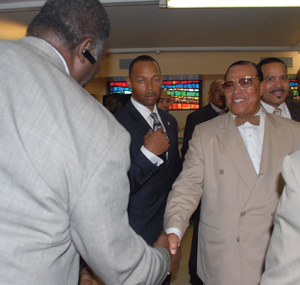
Min. Farrakhan greets a pastor. Photos: Richard B. Muhammad
|
When the pastors go out among the people, the people are saying, “Pastor”—in other words, they always have a hand out (as if they need something). But, we are supposed to be their servants. Not their masters, their servants. The scripture teaches,“He that would be great among you, let him be your servant.” And you know, as you come into this life—and I’m just saying this because I’ve learned this from studying my own behavior: Every one of us, as pastors, has to study our behavior, and study our motives for saying things and doing things. “Why did you say that?” “Why did you do that?” I realized at one point in my development that I did love God, but I couldn’t say “with all my heart, my soul, my mind and my strength.” I loved Him, but I loved “a little something” for me too. How many of us are like that? We must understand that until we humble ourselves, God cannot exalt us to the position that “Christ’s followers” are destined to be exalted to. We abort the process: Some of us right now are in an aborted state of development, because somewhere along the way we felt it was “we” [who deserves “all praise”]. Sometimes I listen to people talk, and I hear this “big I”—(“And you know, I ... Yeah, I called it! I did this!”)—but Jesus said, “I can of myself do nothing.”
If Jesus could talk like this, what do we look like talking like a “big I”? And you know when you start talking like that in the church, the people start leaving you, because the people have enough sense to know that you can’t do anything without them. You have to be humble enough to entreat them to walk with you, and help you to do God’s Will.
Now God is not causing me to say these things for “applause”; I have, by His Grace, lived long enough to know how much of “nothing” I am. That “I” in you is God in you, but you have to put the “I” in you under The Control of The God, lest the “I” in you and me make us think we are God beside Him. Does that make sense? God, in The Qur’an, can say “I”—but God is so beautiful, that He says “We” (as in “And We ‘did this’ ”); yet He is alone, He doesn’t have any companions as such, but He says “We” because He brings us into working with Him by our submission to His Will. Therefore, living The Life of Jesus is “drinking his blood”. Living The Life of Jesus puts us in the mind and the spirit to do his will.
‘O ye of little faith’: The difference between ‘praying’ and ‘doing’
There is a lot of work to be done out there. You can “pray”—but who is going to do after prayer? If one prays, “Lord, come down and stop the killing,” well what are you (pastor) here for? If one prays, “Lord, these young people is going crazy! Lord, help ’em Lord! HELP ’EM!” Well, what does He have you for? The disciples got trifling after a minute; they were so faithless. When Jesus had them in the boat—he was asleep, and the winds began to roar and buffet the boat about, and they said, “Master, wake up! We’re about to die up in here!” And Jesus went to the front of the boat and said, “Peace be still.” Then he looked at his disciples and said, O ye of little faith.”
Dear pastors: If you had faith, just the grain of a mustard seed, you could say to the mountain “Be removed,” and it would be so. Now that’s powerful. So you’re looking for somebody to create the change? Go home and look in the mirror and say, “Father, help me to be the change that I have been looking for”—because one believer, with faith, can change that reality. And imagine if 10 of us had that faith, 20 of us had that faith, 100 of us had that faith? We could clean this city up. You don’t have to “pray,” now, for the city: You’re in it, the filth is there, so [determine]: “Lord, I’m going to tackle it.” ...
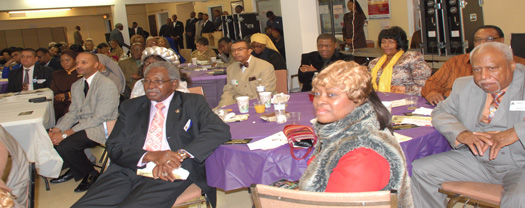
In addition to spiritual guidance, Min. Farrakhan shared how the pastors could mobilize the community to boycott holiday spending to force the issue of justice in the wake of a rash of police killings of unarmed Black youth across the country.
|
If my words stimulate thought that turns on a “light” that exposes a defect, then thank God; because we can’t be perfected unless our defects are manifested, and we deal with them. And the process of perfection doesn’t start with the “little Believer,” it starts at the top with those of us who are calling people to The Way of God. ... ...
“C.O.G.I.C.”: What does that mean? “Church of God in Christ.” That’s a beautiful name—but we are so far away though, brothers and sisters; it’s a good name that we have to live up to.“Let this mind be in you, the same that was in Christ Jesus”: God is offering you Himself, His Mind, His Spirit, His Will. But you have to bow down, and come up out of the world—because this world is not of God. When you pray for the world, you’d better know what to say:“Father, quickly, destroy this world, because this world is not of You.” From the time Adam rebelled, a rebellious world has come in that is called “death”—so pray: Father, I am with You to end this world. I am with You to bring in a better world.” How could you say this is “God’s world” when you have to pass by our women and girls that are being trafficked right under our eyes?
The Black community is not a “community,” it is a colony! But what is a “colony”? It’s a group of people in a separate condition, but segregated, where the power is from the outside ruling that colony, extracting the wealth of the colony for the master. That’s why the mayor calls you all downtown ... I’ve got to say it: Because he rules the colony through the preachers that he controls, the businessmen that he controls, the politicians that he controls. You are not God’s man-made unless you can stand up like a man in His name, and free your people from outside control.
Beloved pastors, a “colony” is what 13 of them were that gave birth to a “nation”; that’s why the troops of King George were here: To control the colony, and extract from the colony wealth and send it back to England. Now look at yourself; then, go see the Chinese community: It’s separate, but it’s not segregated; the power of that community comes from that community. Go among the Chinese; if you want to set up a business, you can’t set it up in Chinatown—they’ll tell you quick! They’re not racists, they’re just prideful (“You want to set up a business? Set it up where you live. But in my community I set up all the businesses here; I’ve got my own chamber of commerce... And guess what? I’ve got my own police.”) You’re crying about how “White folk come in here, kill our Black people,” because you’re nothing but a colony, and they are not in the colony to serve and protect but to keep the colony in a colonial status for the benefit of downtown, the state capital, and the federal capital, [and say to you]: “And we’ll call you when we need you, n---a”; or, “So I’m about to run, n---a; come downtown, I’ve gotta talk to you”; or, “Now reverend, I want you to deliver the people, and if you let me get in I’ll give you a little something.”
You’re just like Lazarus: You’re hanging around the table—for crumbs? A crumb can satisfy a bird, for a minute, but you’ve got a people that’s hungry, a people that’s thirsty; but for the crumbs that government gives you, you sell out the aspirations of your people. These are not “disciples of Christ,” these are hirelings. (Book of John, Chapter 10) I want to be a good shepherd; but the good shepherd has to be willing to lay down his life for the sheep.
INSIDE STORIES AND REVIEWS
-
-
About Harriett ... and the Negro Hollywood Road Show
By Rabiah Muhammad, Guest Columnist » Full Story -
Skepticism greets Jay-Z, NFL talk of inspiring change
By Bryan 18X Crawford and Richard B. Muhammad The Final Call Newspaper @TheFinalCall » Full Story -
The painful problem of Black girls and suicide
By Charlene Muhammad -National Correspondent- » Full Story -
Exploitation of Innocence - Report: Perceptions, policies hurting Black girls
By Charlene Muhammad -National Correspondent- » Full Story -
Big Ballin: Big ideas fuel a father’s Big Baller Brand and brash business sense
By Bryan Crawford -Contributing Writer- » Full Story






 Click Here Stay Connected!
Click Here Stay Connected!








